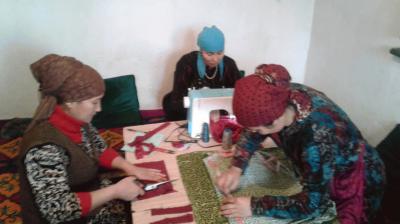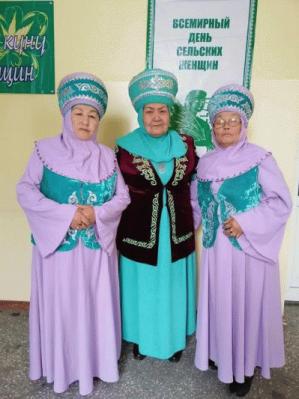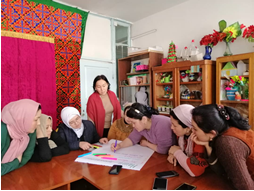- TOP
- 国際人権基準の動向
- FOCUS
- March 2020 - Volume 99
- Rural Women for Sustainable Development
FOCUS March 2020 Volume 99
Rural Women for Sustainable Development
Rural women in Jerkazar village, Isyk-Ata Rayon in Kyrgyzstan decided in 1995 to establish an organization of women to address the violation of their rights to land. At that time, Kyrgyzstan was implementing an agrarian reform program and women (especially single mothers, widows and single unmarried women) were treated unequally in acquiring land. This organization, named Alga Rural Women’s NGO (Alga), has since then been working for the improvement of the social status, and economic and living conditions of rural women, and creating enabling environment for women’s participation in economic life of the village and in decision-making processes of the local government.
The transition of Kyrgyzstan to market economy in early 1990s shocked the country and its people. Rising unemployment, reduction of state social protection services and deterioration of the living standard of the majority of the population, especially the rural women, were the consequences of the new economic system. Rural women were pushed into vulnerable situation with the growth of poverty, deterioration of the public health system, work and home responsibilities and lack of control over family resources. This situation existed in the context of patriarchal traditions and norms that affected their status in the family and society and increased gender-based violence and discrimination.
Alga aims to improve the status of rural women and their standard of living by raising their awareness of these realities, building their capabilities for self–actualization, strengthening their participation in the economic development programs and advocacy for their rights, and adoption of empowering strategies and structures that can raise their social status and economic condition. Alga also helps strengthen their social partnership with different stakeholders to ensure gender equality and support for empowering strategies and structures which promote the status of women and their families.
One of the advantages of Alga is the diversity of its membership: their age varies from seventeen to seventy years old; some of them are widows, single mothers, divorced women and mothers with many children.
Alga developed a comprehensive program for rural women empowerment and integration of gender approaches in sustainable livelihood programs that support poverty alleviation. This program has several components:
a. Leadership development and strengthening of capacity of the poor rural women to lift themselves out of poverty - this component includes increasing capacity to participate in rural community development and budgeting, facilitating access to resources (such as funds/loans) and introducing innovative technologies (such as those that protect the environment and prevent the pollution of ground water and the introduction of alternative energy resources). It also includes the creation of community groups, rural women’s groups, youth alliances and networking; and
b. Information and awareness-raising campaigns, community meetings, and consultations - these activities focus on sustainable livelihoods and strategies which require consultation and assessment with the women on their needs and priorities, and information dissemination on methodologies for developing personal or household strategies to attaining sustainable livelihoods, and on needs and opportunities for income generating initiatives.
Rural Community Activities
Alga starts rural community activities by organizing participatory community assessment, information campaigns on women’s rights (social, political and economic), and other strategies to reach out to rural women, especially those belonging to ethnic minority communities and religious groups. These activities are done during informal meetings in the women's homes, cultural gatherings, meetings (in local schools, village shops and halls), family events and other occasions.
The rural women view the existing economic problems that affect their needs as relating to land and property rights, labor migration, unemployment, payment gap and low wages for women, poor social infrastructure, and lack of support for starting small business (existing programs are generally not considerate of the situation of women). The problems in engaging in small business include high interest rate and guarantee requirement (collateral) by microfinance agencies, gender-based violence suffered by those who travel to market places, lack of vocational education and affordable technologies, and lack of access to agricultural inputs and financial resources to support their entrepreneurial endeavors. Land laws are biased against women and do not consider cultural traditions that often place land in the hands of men. Rural women often work in the informal sector and lack basic social protection such as sick pay, maternity leave or retirement. Women spend an average of four and a half hours on unpaid domestic labor that limit their opportunities and choices.

Rural women want to discuss all sorts of agro-economic, livestock and business planning issues. They also want to learn about waste management, water scarcity, and adaptation and alternative technologies in response to the impact of climate change. Alga’s activities have very good resonance in the communities. Besides training and consultation for women, development of social partnership with local authorities and other stakeholders is very important. This is particularly effective when their requests for service are in line with government programs, such as the national program for regional development. Women’s networks in turn provide a good vehicle to disseminate messages about these programs and take active part in their implementation.
Rural women want to learn from other women with similar problems, experiences and also best practices. They organize peer exchange system to scale up the impact of good experiences.
Besides their work on income generation initiatives, women express interest in getting more involved in the implementation of the new Development Agenda 2030 and Sustainable Development Goals in their communities. More than ten initiatives on the improvement of local social infrastructures in accordance with women’s needs and priorities have been developed and implemented with the support of the local authorities. These initiatives of women's groups are appreciated by the community and local authorities; some of them received Letters of Appreciation and Gratitude presented during the celebration of the National Rural Women’s Day (June 18th) and World Rural Women’s Day (October 15th).
Alga’s members actively participated in local and national campaigns for the adoption of new laws on prevention of domestic violence, prohibition of religious child marriage and 30 percent quota for women in the National Parliament and Local Councils (rural self–governance structure).
For women’s economic empowerment during the 2018-2020 period, Alga created vocational training courses in places where rural women live. These vocational courses are organized mainly for young women from poor families, ethnic minorities, and also for migrant women. The courses allow them to find jobs or start their own business using the practical skills (such as tailoring skill) they acquire. There is a high demand for tailors but the training on tailoring is normally expensive, available only in cities and mainly for men (in accordance with tradition). Women with tailoring skill are also able to improve their economic well-being through savings in the family budget by sewing or mending/altering clothes for family members or household items such as curtains, beddings, bed covers, blankets and pillows.
Cases of Women's Empowerment
Alga’s support to rural women’s business initiatives yielded good examples of women’s economic empowerment. Below are some experiences:
1. Raising livestock for meat and milk production and home gardening - Mehriban L., a woman from the Turkish ethnic minority diaspora in the Krasnaya Rechka village, raised young cattle (a bull and a milking cow) with the help of her family members. The meat of the bull and the cow’s milk were later sold in the market, with some amount of milk left for family consumption. She also planted different varieties of fruits and berries in her garden. Mehriban said that this opportunity helped a lot in improving her status within the family and gave her “personal power.” She learned many things during the Alga meetings and training and became more self-confident. Her communication and networking with women in her village and those from other villages improved to a great degree. When Mehriban became seriously ill and was almost paralyzed, the income she earned allowed her to get medical treatment. Inspired by her experience, she planned to increase her domestic farming and production;
2. Meat and milk production, setting up of sustainable feeding base for cattle – Alia K., a woman from Bashkir ethnic minority group in Novo-Pokrovka village, raised calves and sold their meat and milk. With the income earned, Alia’s family was able to buy a small plot of land to construct a separate farm for more cattle breeding. Alia said that this farming initiative was extremely helpful for her personal status and built her self-confidence. Alia wanted to help other rural women by sharing her experience and establishing a demonstration site. She also became more active in the activities of her community;
3. Milk processing, integration of variety of milk products for healthy nutrition – Saltanat N., a young Kyrgyz woman in Beshkungey village, received support from Alga to buy needed equipment like milk separator, refrigerator, and oven for cooking oatmeal and nuts to make granola in a special way. Learning how to produce yogurt and granola, Saltanat sold her products in the market. She also learned how to make soft cheese from the milk her cows produced. After some time, Saltanat managed to find regular customers in the city sports club and fitness center. She said that this support gave her great power —“she feels like she got wings,” “it’s so nice to feel that you can earn your own living”— and she thought of new ideas on how to develop her business further;
4. Livestock farming – Jamila K., a Kyrgyz woman from a poor family in Jerkazar village bought a small calf and a foal. She rented a plot of land to plant crops and established a feeding storage for cattle. She subsequently sold the meat of the horse and the cow’s milk, with some milk left for her children’s consumption. Jamila said that this income generating activity was a very important experience considering that she failed to get credit from a microfinance company because of lack of property to guarantee the loan. As a result, Jamila was able to fulfil her old dream of building a new house for her big family. Jamila said that “It’s difficult to express that special feeling that you can bring change to the living standards of your family and that your kids can have a dignified life, it’s really incredible!;”
5. Home gardening and making fruit and vegetable preserves – Gulzara A., a Kyrgyz widow with a big, poor family in Internationalnoe village, learned different gardening technologies and established a shop for producing various preserved fruits and vegetables for the local market. She also taught her neighbors how to enrich family nutrition and store food for winter. Young women in rural communities suffer from anemia because of lack of good nutrition, vitamins and minerals. Gulzara had good harvest of fruits (apricot, apple and berries – raspberry, blackberry) and vegetables that she made into preserved food both for family consumption and for sale. She also invited other women to help her. Her shop acquired a good reputation in the community, and women working outside the village became her customers. Thanks to the income of her small business, Gulzara now could afford to pay for the preschool education of her children and more time for her own training and business. She was able to repay part of her housing loan, pay for the education of her children and take care of her aging parents. She expressed having increased self-confidence and that “she is a mistress of her own life.”
Final Note
Alga believes that the potential of rural women to become leaders in the work for sustainable development can be nurtured. Rural women are a big resource in strengthening the capacity of local communities to become active participants in the local and national policy development processes and to be fully involved in realizing national programs that directly impact their lives.
For further information, please contact: Alga Rural Women's NGO, Aidarbekov Street, Jerkazar village, Ysykata raion, Chui oblast, Kyrgyzstan 722177; ph +996555554926; fax +996 (312) 610 022; e-mail: ngoalga@gmail.com.


